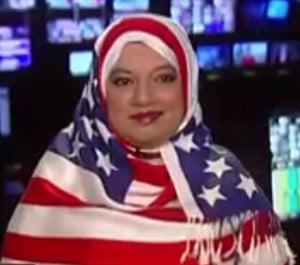Disclaimer: The purpose of this post is not to side with either the government or the opposition of Iran, but to analyze the use of gender in a recent campaign.
Being a woman is considered so shameful that if you are an outspoken male opposition supporter in Iran, the press will release a picture of you wearing a headscarf and chador to humiliate you.
This is exactly what happened to Majid Tavakoli, a prominent student leader in Iran (image below). Tavakoli was arrested in last week’s student-led protests after he gave a speech urging students to reject “tyranny,” a call greeted by chants of “death to the dictator.”

Speculations have been going back and forth between pro-government and opposition media: no one knows if Tavakoli was arrested while disguised as a woman, forced to wear the clothing after being arrested, or if the photo itself was simply digitally altered. But the overreaching message is that women’s clothing–and by extension, women–was used to disgrace Tavakoli.
The contempt for women displayed in the shaming campaign is shocking. That women would be shown vindictiveness so publicly, in a country that is supposedly amongst the more progressive Islamic governments, is ironic – but steps taken by Iranian bloggers and other supporters who are participating in the solidarity campaign do provide respite from the bitter reality.
Even if Tavakoli did disguise himself as a woman, the fact that it is viewed as a shameful act and used to humiliate him is telling of the gender strata that exist within Iranian society. By depicting Tavakoli wearing women’s clothing, the media campaign sought to make him less of a man. Since men and women are thought to be opposites and have opposite traits (i.e., men are strong and hard, women are weak and soft), feminizing Tavakoi with a chador is intended to denigrate his masculinity. The intention was to underscore his value as a student leader and contribute to the demobilization of the opposition movement. Instead, a rather interesting development has unfolded.
Iranian men are showing their solidarity with Tavakoli by wearing headscarves and chadors. Photos of covered men are popping up on Facebook and Twitter and blogs. Not only are they showing their support for Tavakoli, but also for women, who, by inference, are on the bitter end of this campaign as the “lesser sex”.

The bold act by these men who have submitted their hijab photos may be reflective of a growing shift in perspectives of women amongst ordinary Iranians. This is a very positive sign that there are men out there who do not view women as shameful or less valuable human beings, and are willing to take on the very symbol of femininity (the hijab or chador) in solidarity with them. Although their primary reason for doing so is to support Tavakoli, the connotations of gender solidarity are too strong to ignore. Many of the male supporters themselves say that they stand with Tavakoli and with Iranian women.” Hamid Dabashi, professor of Iranian studies at New York’s Columbia University, told CNN that he is
Proud to wear my late mother’s rusari, the very rusari that was forced on my wife in Iran, the very rusari for which my sisters are humiliated if they choose to wear it in Europe, and the very rusari that the backward banality that now rules Iran thinks will humiliate Majid Tavakoli if it is put on him — He is dearer and nobler to us today than he ever was.
The fundamental question underlying this story is an age-old one: why are women viewed as lesser beings in traditional Islamic cultures (note: not in Islam)? This story reflects the macrocosm of the majority of Muslim societies, whereby women are marginalized and given a lower status than men in the name of “Islam”. Too often, in both the Muslim and non-Muslim world, women are the scapegoats and symbols for many things unclean and unwanted–from adultery to minaret bans–and this story is yet another sorry example of the depreciation and denigration of Muslim women.














